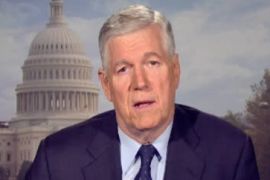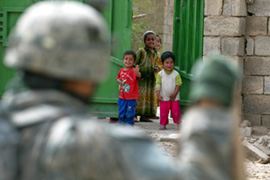Interview: Richard Myers
The most senior US military officer in the run-up to the Iraq war talks to Al Jazeera.

 |
| Myers said progress in Iraq after the US-led invasion in 2003 has been ‘uneven’ |
Five years after a US-led coalition began its invasion of Iraq, the country is experiencing violent sectarian attacks, economic freefall and discord among political groups.
Al Jazeera’s Teymoor Nabili asks General Richard Myers, the highest-ranking US military officer in the run-up to the invasion in 2003, how he rates the success of the invasion and subsequent efforts to promote stability in Iraq.
A former general of the United States Air Force (USAF) and a former chairman of the Joint Chiefs of Staff, Myers was instrumental in planning the 2003 military operation.
Teymoor Nabili: How do you measure the progress in Iraq?
Richard Myers: Since the middle of last year to now, there has been a 90-percent reduction in ethno-sectarian violence. That is certainly a lot of lives that have not been lost. There is a 70 percent [drop] in coalition and civilian casualties as well.
That is progress … but my main point would be that this is not a situation that is going to be solved militarily. It is going to take progress on the political front, inside the Iraqi parliament and the Iraqi government.
President Bush didn’t mention any political progress in his speech at the Pentagon on Wednesday at all. In fact, the idea of political progress seems to have dropped entirely from Washington’s agenda at the moment. How much political progress has been made?
Well, I hope it has not been dropped from the agenda. When the president announced the surge I noted a couple of things. He talked not only about a surge in military forces – he talked about political and economic progress.
And how much of that has been achieved?
| Your Views |
On both fronts, I think some [progress] has been achieved. I think there has been some political progress in the Iraqi parliament and at the local level, and in the revenue flowing down to the provinces.
The thought that there would even be provincial governments that could develop budgets and handle these kinds of resources two years ago would have been a dream. Now it is reality.
But clearly it is not enough. The energy-sharing laws and reconciliation issues need to be worked, and worked at the national level, so that everyone feels that they are going to get a fair shake.
During his speech at the Pentagon on Wednesday, President Bush concentrated almost his entire attention on the idea that somehow the problem in Iraq is al-Qaeda. It was only a few years ago that you began to back away from the idea of this global ‘war on terror’. How do you react to Bush thinking about the situation in Iraq in such simplistic terms?
I hope I was not misperceived. I still believe very much in global violent extremism being a huge issue that we have not yet effectively dealt with. But inside Iraq I think al-Qaeda has been dealt a serious blow. They are not the al-Qaeda they were when I was in Iraq as chairman.
 |
| Iraqi civilians are facing continued hardship despite the presence of US troops [AFP] |
But is al-Qaeda the main enemy in Iraq?
It’s one of the enemies. Clearly it is the enemy of stability and security in Iraq. Their whole goal is to disrupt the process in Iraq [so] you can’t have a stable nation.
The last thing al-Qaeda want to see is a stable constitutionally-driven government.
Do you think they would be there at all if the ‘shock and awe’ that you helped launch had been effective?
I’m not sure I get your point – if we had not gone into Iraq in the first place?
Al-Qaeda was not there before you turned up, was it?
That’s correct, that’s correct. But they weren’t on 9/11 until they came to 9/11. They went to the sounds of the guns and they saw the danger of a stable country right there in the middle of the Middle East, one that had great wealth and water. So they went to the sounds of the gun.
You’ve been there since the beginning. Are you happy with the way things have gone and do you think that the original peremptory self-defence which President Bush used to justify this war still holds any validity?
In this day and age, where we have access to weapons of mass destruction and ruthless people, I think you have to be prepared to take the kinds of steps that we took in Iraq. I’m comfortable with that.
But progress has clearly been uneven. As I left office in 2005 we finally had a constitution that had been voted on and Iraqis were selecting a parliament and then a government, shortly after I had left.
Then there was the bombing of the mosque in Samarra in early 2006, which fomented all this sectarian violence. So it’s been uneven. Clearly there are some people who don’t want Iraq to be successful.